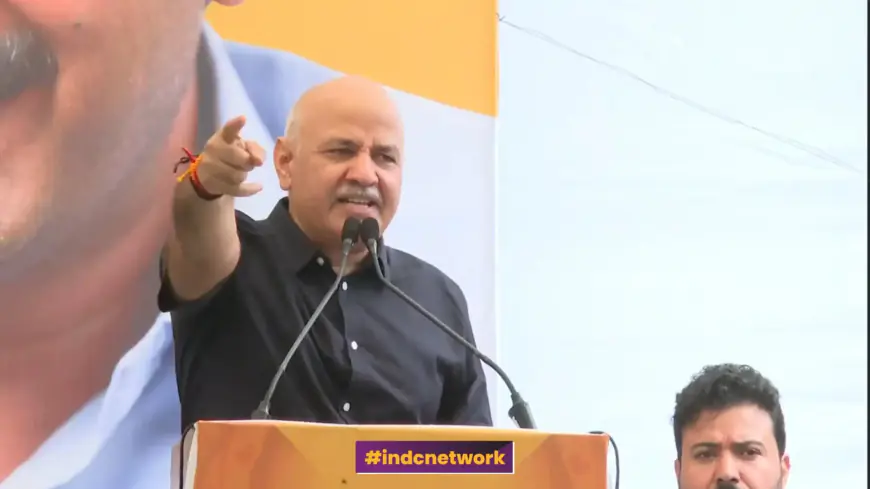Manish Sisodia Calls for Resistance Against "Dictatorship" After Release from Jail
After being released from a 17-month incarceration related to the Delhi excise policy case, Aam Aadmi Party (AAP) leader Manish Sisodia called upon party members and citizens to resist what he describes as a "dictatorship" under the current government. Targeting the BJP, Sisodia emphasized the supremacy of the Constitution and defended Delhi Chief Minister Arvind Kejriwal, who remains in jail under similar allegations. Sisodia also criticized the government's handling of wrestler Vinesh Phogat's controversy, highlighting the broader issues of political repression.

INDC Network : New Delhi : India : Former Delhi Deputy Chief Minister and senior Aam Aadmi Party (AAP) leader, Manish Sisodia, recently emerged as a vocal critic of what he termed as the "dictatorship" prevailing in India. His remarks came just a day after being released on bail, having spent 17 months in jail under allegations connected to the now-defunct Delhi excise policy. Addressing a crowd of AAP supporters at the party’s headquarters in New Delhi, Sisodia delivered a passionate speech condemning the Bharatiya Janata Party (BJP), which he accused of subverting democratic principles and undermining the Constitution.
Sisodia's arrest in February 2023 by the Central Bureau of Investigation (CBI) was a significant blow to AAP, as he was a key figure in the Delhi government, holding 18 ministerial portfolios before his resignation. The arrest was linked to accusations of corruption and money laundering in connection with the controversial Delhi liquor policy. Following his detention, Sisodia's prolonged incarceration without trial became a subject of widespread criticism, with many viewing it as politically motivated. The Supreme Court, in its ruling to grant him bail, underscored the principle that "bail is the rule, jail is the exception," criticizing the lower courts for repeatedly denying his bail requests.
Upon his release, Sisodia was welcomed by a throng of AAP workers and leaders, including Atishi Marlena and Sanjay Singh, who hailed his freedom as a victory for justice. In his address, Sisodia did not mince words, attacking the BJP for what he described as a systematic erosion of constitutional rights. "No party or individual is more powerful than the Constitution," he asserted, emphasizing that the ongoing "dictatorship" must be resisted by every citizen. He painted a grim picture of India under the current government, where not only political leaders but also ordinary citizens are being harassed and jailed for opposing the ruling party.
One of the most striking aspects of Sisodia's speech was his unwavering support for AAP chief and Delhi Chief Minister Arvind Kejriwal, who is also embroiled in the same case. Kejriwal, according to Sisodia, symbolizes honesty in India—a leader whose integrity is being targeted through a concerted campaign of defamation. Sisodia declared that if opposition leaders could unite against the "dictatorship," Kejriwal would be released from jail within 24 hours. This statement underscored the gravity of the situation and the importance of collective action against what Sisodia perceives as an authoritarian regime.
Sisodia's speech was not just a defense of his own actions and those of his party; it was also a call to arms for all those who believe in democratic values. He described AAP members as "horses of a chariot," with their true leader, Kejriwal, currently in jail. This metaphor highlighted the idea that while Sisodia and other party members are important, the real driving force behind AAP's mission is Kejriwal, whose eventual release would mark a significant victory for the party and for democracy in India.
The former deputy chief minister also took the opportunity to reflect on his time in jail. He revealed that while he had initially hoped for a speedy trial and justice within seven to eight months, his detention stretched to 17 months. Despite the prolonged wait, Sisodia expressed a sense of vindication, stating that "truth has triumphed" with the Supreme Court's decision to grant him bail. This remark resonated with the broader narrative of justice delayed but not denied, reinforcing the belief that the Constitution ultimately prevails over authoritarianism.
Sisodia's criticism of the BJP extended beyond his own case and that of Kejriwal. He also touched on the issue of businesspeople being imprisoned on allegedly false charges for not donating to the BJP. This accusation reflects a broader concern within AAP and other opposition parties about the misuse of state power to suppress dissent and coerce financial support from the private sector. Sisodia's comments suggested that the current government's actions are not just politically motivated but are also economically oppressive, targeting those who refuse to align themselves with the ruling party's interests.
In his speech, Sisodia also made a pointed reference to the case of wrestler Vinesh Phogat, who was disqualified from the Paris Olympics for being slightly overweight. Phogat had previously led a protest against Brij Bhushan Sharan Singh, the former head of the Wrestling Federation of India and a BJP leader, accusing him of sexual harassment. Sisodia's mention of Phogat's disqualification, without directly naming her, was a thinly veiled criticism of the government's handling of the case. It highlighted how those who stand up against the BJP, whether in sports or other fields, face severe repercussions.
Sisodia's release and his subsequent speech have sparked a renewed sense of urgency within AAP and among its supporters. His words have resonated with many who view the current political climate in India as increasingly hostile to democratic norms and freedoms. By framing his release as a victory for the Constitution and a defeat for "dictatorship," Sisodia has positioned himself and AAP as defenders of democracy, fighting against an oppressive regime that seeks to silence opposition.
The Supreme Court's decision to grant Sisodia bail has been widely interpreted as a significant moment in the ongoing battle between the judiciary and the executive in India. The Court's emphasis on the importance of the right to a speedy trial and its criticism of the lower courts' handling of Sisodia's case have been seen as a rebuke to the government's approach to law and order. This ruling has not only brought relief to Sisodia but has also sent a strong message about the judiciary's role in upholding the Constitution and protecting individual rights against state overreach.
As Sisodia re-enters the political arena, his focus will likely remain on challenging what he perceives as the authoritarian tendencies of the BJP. His release has invigorated AAP's campaign against the ruling party, with leaders like Sanjay Singh and Gopal Rai framing it as a "victory of truth" and a "slap on the face of Centre’s dictatorship." This rhetoric is likely to escalate as AAP continues to position itself as a key player in the broader opposition to the BJP at both the state and national levels.
In conclusion, Manish Sisodia's release from jail and his subsequent remarks have reignited the debate over the state of democracy in India. His strong condemnation of the BJP's tactics and his defense of the Constitution have resonated with many who are concerned about the direction in which the country is headed. As AAP gears up for future electoral battles, Sisodia's experiences and his outspoken criticism of the government will undoubtedly play a central role in shaping the party's strategy and messaging.
What's Your Reaction?














































































































































































